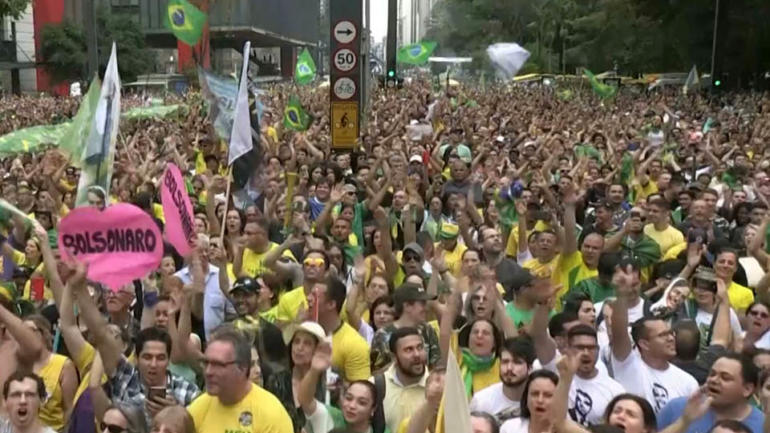On Sunday, more than 147 million Brazilian voters will be eligible to cast their ballots to choose a majority of the country’s political seats. But many of those going to the polls, where voting is compulsory, are only concerned about one thing: the presidential elections.
CGTN’s Lucrecia Franco reports.
As they get closer, political discussions have intensified, that is because Brazil´s general elections this year are split almost exclusively between two candidates.
One from the leftist Workers Party, Fernando Haddad and the other on the far-right, Jair Bolsonaro, whose remarks have offended women, Afro-Brazilians and minorities.
Some voters are choosing to vote for what they consider the lesser of two evils.
“I am for Bolsonaro but I don’t like him. I don’t think he is the best candidate, but he is the only one that can beat the leftists in this country,” said a lawyer buying fruit in a street market.
Andre Santos, a vendor at the same open market expressed the opposite, “I am for Haddad, because I don’t believe in Bolsonaro’s proposals. They are all lies.”
Polls suggest the election is one of the most polarized in decades and this started in 2016 with the impeachment of President Dilma Rousseff of the leftist Worker’s Party.
Bolsonaro, a former congressman and now the leading candidate, made headlines when he voted for the impeachment of Rousseff in the name of the general who ordered her torture when she was a leftist guerrilla.
It was a declaration of war against the Workers Party and, with Rousseff’s impeachment, the worst recession in the country’s history and a widespread graft scandal, Bolsonaro emerged as a corruption-free strongman candidate.
Haddad, a former Sao Paulo mayor, replaced ex-president ”Lula” da Silva, who was barred from running because of a corruption conviction.
Opinion polls show Haddad surged into second place with 22 percent but still trailed Bolsonaro who had 35 percent of voter support. Neither candidate appeared to have the 50 percent necessary for a first ballot victory.
Political analysts said the centrist parties may be the biggest casualties because they expect to attract more of the electorate.
“So, it’s well characterized these extremes, these two poles and at the middle, the political center, has simply disappeared,” said Geraldo Monteiro, a political analyst at Rio de Janeiro’s State University.
There is political fatigue in Brazil, observes say, but after Sunday, all sides will have their answer, with the likelihood of a runoff between the two top vote winners at the end of the month.
AP Reporter Mauricio Savarese on Brazil Elections
 CGTN America
CGTN America

